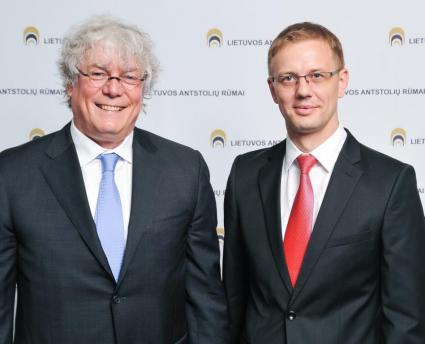An International Conference Marked the First Decade of Lithuanian Enforcement Agents
On 24 May 2013 an international conference „A Decade of Practice of Lithuanian Judicial Officers: Achievements and Challenges“ was held in Vilnius, capital city of Lithuania
Leo Netten, President of the UIHJ, Aleksandras Selezniovas, Chairman of the Presidium of the National Chamber of the judicial officers of Lithuania
Leo Netten, President of the UIHJ, Bernard Menut, first vice-president of the UIHJ, representatives from Lithuanian government institutions, courts, and universities attended the conference.
During the course of the conference the role of autonomous enforcement agents within the legal system and economy was discussed, the main challenges of the decade were reviewed.
Aleksandras Selezniovas, Chairman of the Presidium of the Chamber of Judicial Officers of Lithuania pointed out that the anniversary proves the Lithuanian enforcement agents have successfully passed the test of time. Actual recovery of debts has risen 3-4 times during the decade. Approximately 223 thousand EUR of debts are returned to creditors every day. Construction of one house per day might be financed by these funds.
It was also noted that within the second decade of their activities, enforcement agents have to expand possibilities of enforcement of decisions and to recover debts from different sorts of property.
„We have potential to develop our services. Enforcement agent might be able to act as an auditor, organizer of voluntary auctions, administrator of bankruptcy and reorganization proceedings, legal consultant. We believe, that at least a part of these functions will become ordinary activities of enforcement agents during the second decade“, A. Selezniovas said.
Lately, the enforcement of decisions in Lithuania has been moved to electronic space. Lithuanian enforcement agents are one of the first ones to introduce electronic auction in the region. 3578 electronic auctions were announced from January 2, 2013 till May 20, 2013. Electronic enforcement case functions partially. Parts of procedural documents are drawn up electronically and are signed by e-signature.


